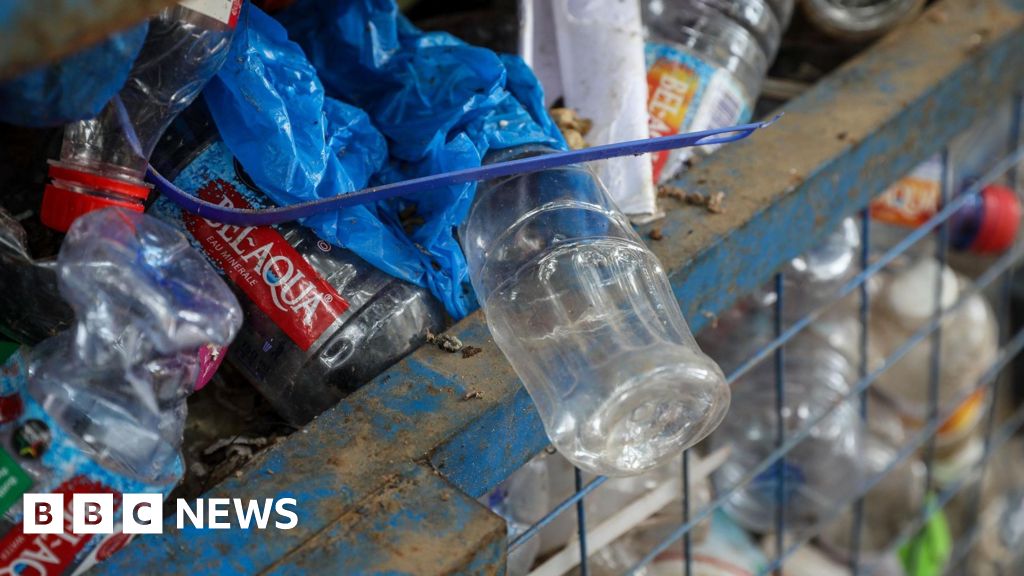Science
Nations Convene in Geneva to Address Global Plastic Crisis

Countries around the world are gathering in Geneva for a crucial United Nations conference aimed at finalizing a global treaty to address the escalating plastic crisis. Despite a commitment made in 2022 for a legally binding agreement to reduce plastic waste and the harmful chemicals associated with plastics, negotiations have yet to yield a consensus after two years of discussions.
The production of plastic has surged dramatically over the past century. In 1950, global production stood at just two million tonnes, but by 2022, this figure had skyrocketed to 475 million tonnes. While plastics have revolutionized various industries due to their versatility and durability, the environmental toll has become increasingly alarming. According to scientists, approximately 200 trillion pieces of plastic are currently floating in the world’s oceans, a number that could potentially triple without immediate intervention.
Dr. Alice Horton, a research scientist at the National Oceanography Centre, emphasizes the rapid proliferation of synthetic plastics. “Plastics have been around for no time at all, and yet we are suddenly realizing there may be problems with it,” she noted. The implications for wildlife are severe, with marine animals often mistaking plastic for food. Zaynab Sadan, global plastics policy lead at the World Wildlife Fund (WWF), highlighted the dangers of ingestion and entanglement, stating, “They can confuse it as food, which then harms their internal organs and can lead to fatalities.”
As plastic breaks down into smaller pieces, known as microplastics, it permeates various ecosystems, from the depths of the ocean to mountain peaks. Ongoing research aims to clarify the full extent of microplastics’ impacts on different species, but early findings suggest that accumulation in animal tissues can lead to inflammation and other long-term health issues.
The health repercussions of plastic pollution extend beyond environmental concerns. A report from The Lancet Countdown estimated that health-related diseases and deaths attributed to the plastic crisis account for at least $1.5 trillion annually in damages. These impacts vary widely, from air pollution linked to plastic production to increased risks of cancer and reproductive issues from plastic contaminants. Alarmingly, only 25% of plastic chemicals are documented for their effects, with 75% of those tested classified as “highly hazardous.”
During the conference, over 170 nations will reconvene to negotiate a treaty that aims to establish consistent design standards for plastic products to enhance recycling efforts and reduce reliance on virgin materials. Rob Opsomer, executive lead of plastics and finance at the Ellen McArthur Foundation, explained that uniform standards can significantly improve the economic viability of recycling. For example, colored plastic bottles have a resale value that is half that of clear bottles, underscoring the need for consistent design.
While nearly 100 countries, including the United Kingdom, advocate for an ambitious treaty that limits production levels, a coalition of oil-producing nations, including Russia and Saudi Arabia, argue for focusing on improved recycling rather than reducing production. As global demand for oil is projected to peak in the coming years due to a shift towards greener technologies, plastic could remain a vital market for the oil industry. Consequently, efforts to curb production may pose short-term economic risks to these nations.
Businesses are also feeling the impact of the plastic crisis. Opsomer noted that companies do not want their brands associated with littered packaging while facing the added burden of navigating numerous evolving standards globally. The Business Coalition for a Global Plastics Treaty, which includes major companies like Nestle and Unilever, is calling for coordinated taxes to fund recycling initiatives and mitigate plastic waste.
On the consumer side, single-use plastics, primarily from food packaging, are the largest contributors to plastic waste. Individuals can make a difference by opting for reusable containers and bags. It is estimated that more than a quarter of microplastics found in the environment stem from car tires, suggesting a need for alternative transportation methods, such as walking or cycling for short trips.
The stakes are high as nations convene in Geneva once again, with the hope that this meeting will finally lead to a comprehensive agreement to address the plastic crisis and its far-reaching consequences.
-

 Entertainment2 weeks ago
Entertainment2 weeks agoAndrew Pierce Confirms Departure from ITV’s Good Morning Britain
-

 Health4 months ago
Health4 months agoNeurologist Warns Excessive Use of Supplements Can Harm Brain
-

 Health4 months ago
Health4 months agoFiona Phillips’ Husband Shares Heartfelt Update on Her Alzheimer’s Journey
-

 Science2 months ago
Science2 months agoBrian Cox Addresses Claims of Alien Probe in 3I/ATLAS Discovery
-

 Science2 months ago
Science2 months agoNASA Investigates Unusual Comet 3I/ATLAS; New Findings Emerge
-

 Entertainment1 week ago
Entertainment1 week agoGogglebox Star Helena Worthington Announces Break After Loss
-

 Science2 months ago
Science2 months agoScientists Examine 3I/ATLAS: Alien Artifact or Cosmic Oddity?
-

 Entertainment1 month ago
Entertainment1 month agoTess Daly Honoured with MBE, Announces Departure from Strictly
-

 Entertainment3 months ago
Entertainment3 months agoLewis Cope Addresses Accusations of Dance Training Advantage
-

 Entertainment5 months ago
Entertainment5 months agoKerry Katona Discusses Future Baby Plans and Brian McFadden’s Wedding
-

 Science2 months ago
Science2 months agoNASA Investigates Speedy Object 3I/ATLAS, Sparking Speculation
-

 Entertainment5 months ago
Entertainment5 months agoEmmerdale Faces Tension as Dylan and April’s Lives Hang in the Balance









